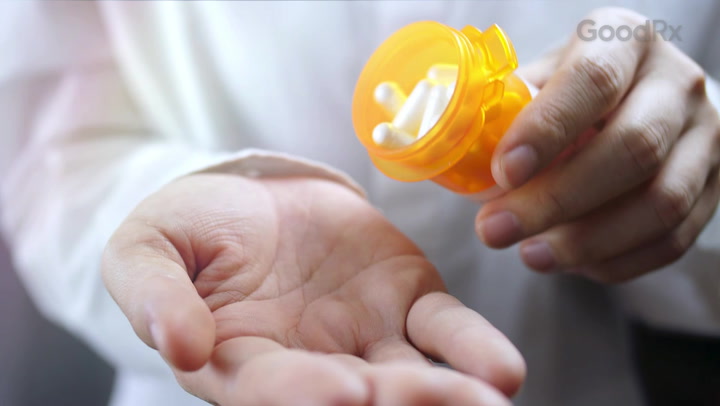
8 Medications That Can Cause Hypothyroidism: Amiodarone, Lithium, and More
Key takeaways:
Certain medications can cause the thyroid gland to become less active than it should be. This is called drug-induced hypothyroidism.
A few different medications can cause drug-induced hypothyroidism. Examples include amiodarone (Pacerone), lithium (Lithobid), and some cancer medications.
If you take these medications, your healthcare team may want to monitor your blood work. This is to see if your thyroid is affected. Tell them if you notice symptoms such as fatigue, increased sensitivity to cold, or weight gain.
You may need to keep taking a medication that’s causing drug-induced hypothyroidism. In this case, you may be prescribed a medication such as levothyroxine (Synthroid) to replace the missing hormones.
Table of contents

Healthcare professionals call it “drug-induced hypothyroidism.” Simply put, it’s what happens when a medication you’re taking causes your thyroid gland to be less active than it should be. Some medications directly affect your thyroid hormones. Others may affect the thyroid gland itself.
So, should you be worried that one of your medications might be making your thyroid gland less active? Below, we explore eight of the most common medications that can cause hypothyroidism. Plus what you and your healthcare team can do to manage it.
1. Hyperthyroidism medications
Hyperthyroidism is a health condition where you make too much thyroid hormone. There are a few different medications used to treat this. Examples include propylthiouracil (PTU), methimazole, radioactive iodine (or radioiodine), and potassium iodine.
As a side effect, these medications can make thyroid hormone levels drop too low. The iodine-containing medications, specifically, destroy cells that produce too much thyroid hormone so that it produces less thyroid hormone.
Antithyroid medications like PTU and methimazole work differently. They block thyroid hormones from being made. Sometimes your thyroid hormone levels can drop too low while taking these medications. If this happens, your prescriber may lower your dose. They’ll work with you to find a balance where your levels aren’t too high or too low.
2. Amiodarone
People take amiodarone (Pacerone) to make their heart beat more regularly. Hypothyroidism (or hyperthyroidism) is possible with amiodarone. But most people taking it don’t develop thyroid issues.
How to look for thyroid problems: Early signs of thyroid problems can be subtle. Read about the symptoms to watch for if you’re wondering about your thyroid health.
Thyroid function tests: It can be tricky to understand blood tests for your thyroid. Learn how to interpret your results.
Levothyroxine tips: A common way of managing drug-induced hypothyroidism is by taking a medication like levothyroxine (Synthroid). Find out how to take it for best results.
There are several ways that amiodarone can affect thyroid function. For example, amiodarone contains a lot of iodine (almost 40%). Iodine is needed for normal thyroid function. But excess iodine can cause several thyroid-related issues, including hypothyroidism. This may be more likely to happen if you already have thyroid problems.
3. Lithium
Lithium (Lithobid) is used to treat bipolar disorder. Lithium can affect thyroid functioning in several different ways. For example, it can prevent thyroid hormones from being made and released in the body. This can result in hypothyroidism.
Hypothyroidism from lithium can happen as early as the first few months of treatment. It’s more likely to occur in certain people, including:
Women who are over 50 years old
People with a family history of hypothyroidism
People with thyroid antibodies (immune system proteins that attack the thyroid cells and tissues)
In some cases, you might notice symptoms of low thyroid hormone while taking lithium. A few examples are fatigue, increased sensitivity to cold, and weight gain. Or there could be changes in your thyroid function tests, even if you don’t have symptoms.
4. Proleukin (aldesleukin)
Proleukin (aldesleukin) is a human-made form of an immune protein in the body called interleukin-2 (IL-2). This medication treats cancers such as skin cancer (melanoma) or kidney cancer.
Proleukin works in the immune system to activate white blood cells to fight against cancer cells. But the immune system may also attack healthy tissue, such as the thyroid gland. In early studies, a small percentage of people receiving Proleukin developed thyroiditis. This is an inflammation of the thyroid gland, which can lead to hypothyroidism.
If it occurs, hypothyroidism from Proleukin usually happens within 1 to 4 months of treatment. Your oncologist will likely check your thyroid function tests before starting Proleukin. After that, they’ll likely continue checking them periodically to see if your thyroid is affected.
5. Interferon alfa
Interferon alfa medications are used to treat conditions such as hepatitis (inflammation of the liver) and different types of cancer. These medications have been associated with hypothyroidism. This is especially true for people who already have thyroid antibodies.
Interferon alfa medications can cause thyroiditis. They can also cause the body to make thyroid antibodies, which can lead to hypothyroidism.
6. Tyrosine kinase inhibitors
Have you heard of tyrosine kinase inhibitors (TKIs)? This class of medications is used to treat different types of cancers and leukemias. Examples include sunitinib (Sutent) and sorafenib (Nexavar). Up to 40% of people who take a TKI will develop hypothyroidism. Studies show that this can happen anywhere from a few weeks to several months after starting the medication.
7. Immune checkpoint inhibitors
Immune checkpoint inhibitors (ICIs) help your immune system fight cancer tumors. Examples include nivolumab (Opdivo), pembrolizumab (Keytruda), and ipilimumab (Yervoy). With ICIs, it’s possible that your immune cells could also attack healthy cells, including thyroid cells. This can lead to hypothyroidism in some people.
In studies, anywhere from 4% to almost 14% of people taking ICIs had hypothyroidism. The risk was greatest with combination therapy (taking more than one ICI at the same time).
8. Thalidomide
Though uncommon, some people have developed hypothyroidism due to thalidomide (Thalomid) therapy. But experts don’t know exactly how it happens. Thalidomide is used to treat many different conditions, including multiple myeloma and leprosy.
How do you treat drug-induced hypothyroidism?
One way of managing drug-induced hypothyroidism is to take thyroid hormone replacement therapy. Levothyroxine (Synthroid) is one medication that can be used for this. Levothyroxine is a synthetic (lab-made) version of T4, one of the two thyroid hormones. It acts like the T4 made by your thyroid gland, helping to bring your levels back up to normal.
Another option is to stop the medication that’s causing hypothyroidism. However, many of these medications offer benefits that outweigh this risk. So it may not be practical to stop taking them just because your thyroid levels are low. In this case, your healthcare team can help determine the best course of action. Don’t stop taking your medication unless they tell you to do so.
Your healthcare team will likely check your thyroid function if you’re taking one of the medications listed above. How often it’s checked may depend on the medication. But you should tell your prescriber if you notice symptoms of hypothyroidism after starting treatment. Examples include fatigue, weight gain, and increased sensitivity to cold.
Frequently asked questions
Medications can cause hypothyroidism in several different ways. Examples of these include:
Blocking thyroid hormone production
Triggering inflammation of the thyroid gland (thyroiditis)
Changing how the body processes thyroid hormones
Interfering with thyroid hormone absorption
Increasing the breakdown of thyroid hormones
Thyroid problems aren’t a typical side effect of antibiotics. But there are some studies and case reports about antibiotics affecting the thyroid. One study found that long-term antibiotic treatment (1 year or longer) may be associated with a higher risk of thyroid cancer. There have also been reports of hyperthyroidism with certain tetracycline antibiotics.
Blood pressure medications aren’t usually known to cause thyroid problems. Some, such as certain beta blockers, are used to treat symptoms of hyperthyroidism. But they aren’t known to cause hypothyroidism.
However, one small study found that spironolactone (Aldactone) may worsen the progression of a condition called autoimmune thyroiditis in men.
The bottom line
Certain medications can cause drug-induced hypothyroidism, or low levels of thyroid hormones. Common culprits include amiodarone (Pacerone, Nexterone), lithium (Lithobid), and certain cancer medications. When taking any of these medications, your healthcare team may check your blood work to make sure your thyroid isn’t affected.
If you develop drug-induced hypothyroidism, talk to your prescriber about the best solution. They may start closely monitoring your bloodwork. Taking a thyroid replacement medication is another common option. For some people, stopping the medication that’s causing hypothyroidism may be the best choice.
Why trust our experts?



References
American Cancer Society. (2019). Cytokines and their side effects.
Barroso-Soursa, R., et al. (2018). Incidence of endocrine dysfunction following the use of different immune checkpoint inhibitor regimens. JAMA Oncology.
Bocchetta, A., et al. (2006). Lithium treatment and thyroid abnormalities. Clinical Practice and Epidemiology in Mental Health.
Carella, C., et al. (2004). Interferon-α-related thyroid disease: Pathophysiological, epidemiological, and clinical aspects. The Journal of Clinical Endocrinology & Metabolism.
de Savary, N., et al. (2004). Severe hypothyroidism after thalidomide treatment. Journal of the Royal Society of Medicine.
Dong, B. J. (2000). How medications affect thyroid function. Western Journal of Medicine.
Farebrother, J., et al. (2019). Excess iodine intake: Sources, assessment, and effects on thyroid function. Annals of the New York Academy of Sciences.
Geffner, D. L., et al. (1992). β-Adrenergic blockade for the treatment of hyperthyroidism. The American Journal of Medicine.
Hamnvik, O. R., et al. (2011). Thyroid dysfunction from antineoplastic agents. Journal of the National Cancer Institute.
Iovance Biotherapeutics. (2024). Proleukin- aldesleukin injection, powder, lyophilized, for solution [package insert].
Kibirige, D., et al. (2013). Spectrum of lithium induced thyroid abnormalities: A current perspective. Thyroid Research.
Krysiak, R., et al. (2020). The effect of spironolactone on thyroid autoimmunity in euthyroid men with Hashimoto's thyroiditis. Journal of Clinical Pharmacy and Therapeutics.
Medić, F., et al. (2022). Amiodarone and thyroid dysfunction. Acta Clinica Croatia.
MedlinePlus. (2022). Radioiodine therapy.
Mohammadi, K., et al. (2023). Prevalence of amiodarone-induced hypothyroidism; A systematic review and meta-analysis. Trends in Cardiovascular Medicine.
Narayana, S. K., et al. (2011). Management of amiodarone-related thyroid problems. Therapeutic Advances in Endocrinology and Metabolism.
Ovčariček, P. P. (2021). Thyroid dysfunctions induced by molecular cancer therapies: A synopsis for nuclear medicine thyroidologists. European Journal of Nuclear Medicine and Molecular imaging.
Park, S. J., et al. (2024). Association between antibiotic exposure and thyroid cancer: A nationwide cohort study in South Korea. Thyroid.
Pollock, A. J., et al. (2016). Severe and persistent thyroid dysfunction associated with tetracycline-antibiotic treatment in youth. The Journal of Pediatrics.
Tomer, Y., et al. (2007). Interferon alpha treatment and thyroid dysfunction. Endocrinology and Metabolism Clinics of North America.
Vialettes, B., et al. (1993). Incidence rate and risk factors for thyroid dysfunction during recombinant interleukin-2 therapy in advanced malignancies. Acta Endocrinologica.
Was this page helpful?
Related Articles
Browse medications
View AllResearch prescriptions and over-the-counter medications from A to Z, compare drug prices, and start saving.

























